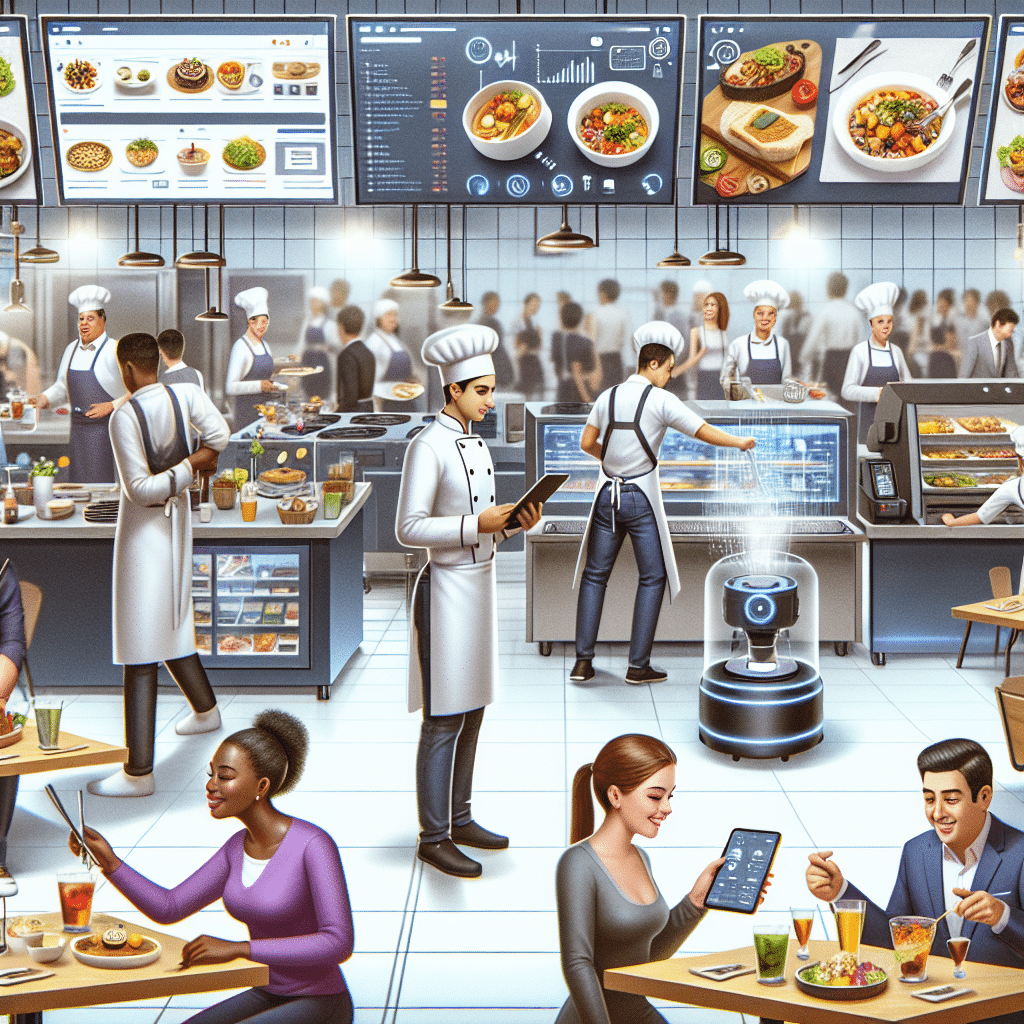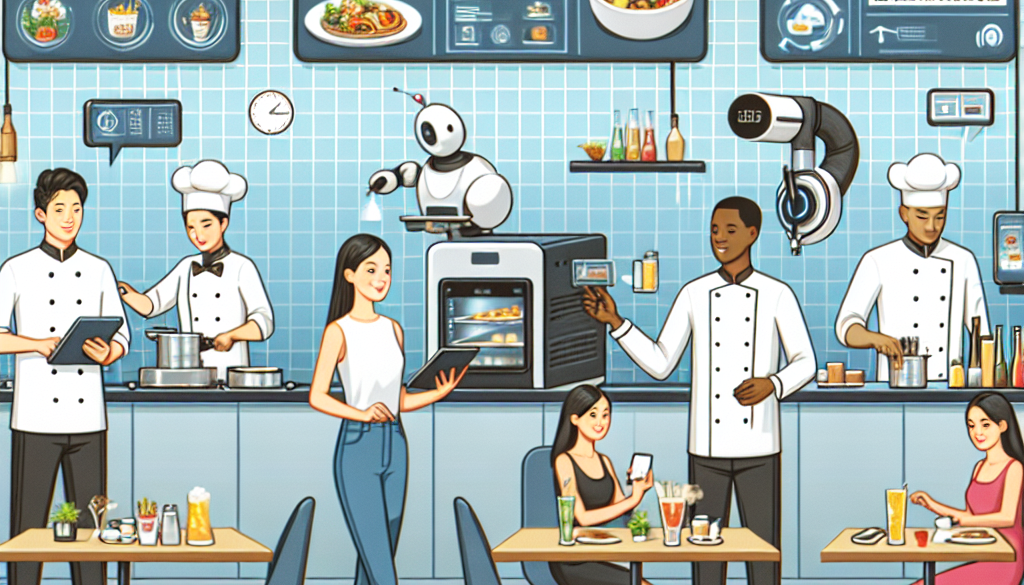Accommodation of Food Service Industry with Emerging Technologies.
-
Table of Contents
- Emerging Technologies Transforming the Food Service Industry
- The Integration of Technology in Food Service
- Artificial Intelligence and Machine Learning
- Robotics and Automation
- Mobile Ordering and Delivery Apps
- Self-service Kiosks
- Internet of Things (IoT) and Smart Kitchen Equipment
- Blockchain for Food Safety and Traceability
- Challenges and Considerations
- Conclusion: The Future of Food Service is Tech-Driven
- ETprotein: Catering to the Protein Needs of the Food Service Industry
Emerging Technologies Transforming the Food Service Industry

The food service industry is undergoing a significant transformation, thanks to the advent of emerging technologies. From artificial intelligence to robotics, these advancements are revolutionizing the way restaurants operate, enhancing customer experiences, and streamlining operations. This article delves into the various ways in which technology is being integrated into the food service sector and the benefits it brings to both businesses and consumers.
The Integration of Technology in Food Service
The food service industry is rapidly embracing technology to meet the changing demands of consumers and to stay competitive in a dynamic market. Here are some of the key technologies that are making waves in the industry:
- Artificial Intelligence (AI) and Machine Learning
- Robotics and Automation
- Mobile Ordering and Delivery Apps
- Self-service Kiosks
- Internet of Things (IoT) and Smart Kitchen Equipment
- Blockchain for Food Safety and Traceability
Artificial Intelligence and Machine Learning
AI and machine learning are at the forefront of the technological revolution in the food service industry. These technologies are being used to personalize customer experiences, optimize inventory management, and even predict future trends. For instance, AI-powered chatbots are now capable of handling reservations and customer inquiries, providing a seamless interaction that enhances customer satisfaction.
Robotics and Automation
Robotics is another area where the food service industry is seeing significant investment. Automated systems are being used for food preparation, cooking, and delivery. In some restaurants, robots are being employed to perform tasks such as flipping burgers or making pizzas, ensuring consistency and efficiency in food production.
Mobile Ordering and Delivery Apps
The rise of mobile ordering and delivery apps has changed the way consumers interact with food service establishments. These platforms offer convenience, allowing customers to order food with just a few taps on their smartphones. According to a report by Statista, the online food delivery segment is expected to reach a market volume of $192.16 billion by 2025.
Self-service Kiosks
Self-service kiosks are becoming increasingly common in fast-food restaurants and casual dining establishments. These kiosks not only reduce wait times but also allow for customized orders, leading to an enhanced dining experience. They also help restaurants to reduce labor costs and improve order accuracy.
Internet of Things (IoT) and Smart Kitchen Equipment
IoT technology is making kitchens smarter and more efficient. Smart kitchen equipment can monitor food temperatures, track inventory levels, and even suggest menu adjustments based on ingredient availability. This level of connectivity ensures that kitchen operations are smooth and that food waste is minimized.
Blockchain for Food Safety and Traceability
Blockchain technology is being used to improve food safety and traceability. By creating a transparent and immutable ledger of food products’ journey from farm to table, blockchain enhances consumer trust and allows for quick action in the event of a food safety issue.
Challenges and Considerations
While the benefits of technology in the food service industry are clear, there are also challenges to consider. These include the high cost of implementation, the need for staff training, and concerns about data privacy and cybersecurity. Additionally, there is the risk of losing the personal touch that is often associated with dining experiences.
Conclusion: The Future of Food Service is Tech-Driven
The food service industry is evolving at a rapid pace, with technology playing a central role in this transformation. From AI to IoT, these technologies are improving efficiency, enhancing customer experiences, and ensuring food safety. As the industry continues to innovate, we can expect to see even more exciting developments that will shape the future of dining.
ETprotein: Catering to the Protein Needs of the Food Service Industry
As the food service industry continues to grow and adapt to new technologies, the demand for high-quality protein products also increases. ETprotein is well-positioned to meet this demand with its extensive range of organic bulk vegan proteins and L-(+)-Ergothioneine (EGT). Their products are ideal for food service businesses looking to incorporate healthy, plant-based options into their menus.
ETprotein’s offerings are characterized by their neutral taste, non-GMO, and allergen-free attributes, making them suitable for a wide array of culinary applications. With the purity of L-(+)-Ergothioneine over 98%, ETprotein’s products are perfect for businesses aiming to provide nutritious and delicious meals to health-conscious consumers.
For food service industry players looking to stay ahead of the curve and cater to the evolving dietary preferences of their customers, ETprotein’s protein products are an excellent choice. To learn more about their offerings or to request samples, contact ETprotein today.
About ETprotein:
ETprotein, a reputable protein and L-(+)-Ergothioneine (EGT) Chinese factory manufacturer and supplier, is renowned for producing, stocking, exporting, and delivering the highest quality organic bulk vegan proteins and L-(+)-Ergothioneine. They include Organic rice protein, clear rice protein, pea protein, clear pea protein, watermelon seed protein, pumpkin seed protein, sunflower seed protein, mung bean protein, peanut protein, and L-(+)-Ergothioneine EGT Pharmaceutical grade, L-(+)-Ergothioneine EGT food grade, L-(+)-Ergothioneine EGT cosmetic grade, L-(+)-Ergothioneine EGT reference grade and L-(+)-Ergothioneine EGT standard. Their offerings, characterized by a neutral taste, non-GMO, allergen-free attributes, with L-(+)-Ergothioneine purity over 98%, 99%, cater to a diverse range of industries. They serve nutraceutical, pharmaceutical, cosmeceutical, veterinary, as well as food and beverage finished product distributors, traders, and manufacturers across Europe, USA, Canada, Australia, Thailand, Japan, Korea, Brazil, and Chile, among others.
ETprotein specialization includes exporting and delivering tailor-made protein powder and finished nutritional supplements. Their extensive product range covers sectors like Food and Beverage, Sports Nutrition, Weight Management, Dietary Supplements, Health and Wellness Products, and Infant Formula, ensuring comprehensive solutions to meet all your protein needs.
As a trusted company by leading global food and beverage brands and Fortune 500 companies, ETprotein reinforces China’s reputation in the global arena. For more information or to sample their products, please contact them and email sales(at)ETprotein.com today.












